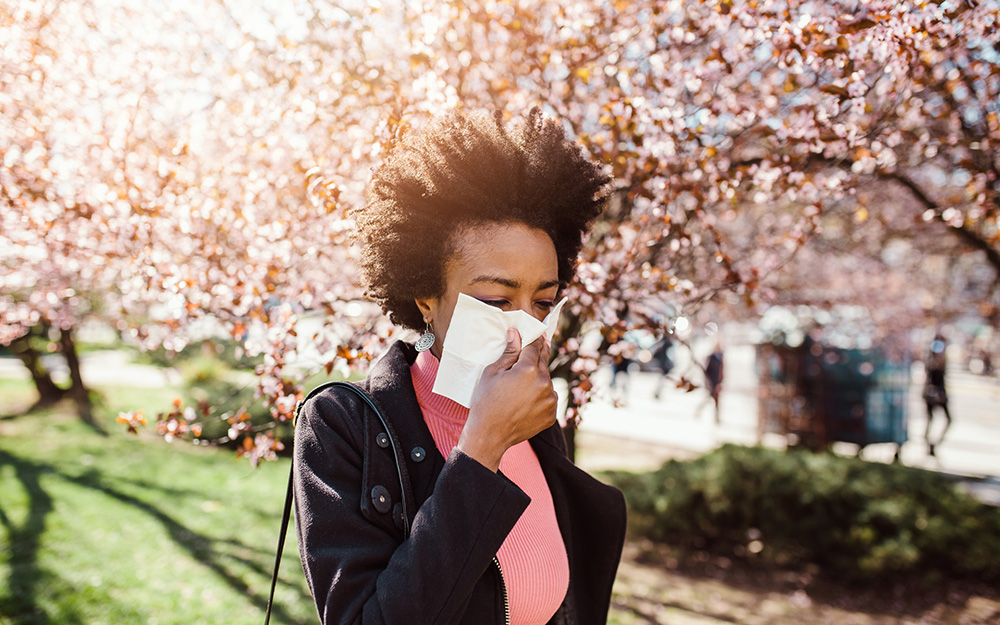The Pros and Cons of Allergy Immunotherapy
Date
June 20, 2024

Date
June 20, 2024
Credits
Medical providers featured in this article


In Brief
{{cta-block}}
The weather’s warmed up and you’re enjoying a barbecue in the park with friends, or you’re on a hike in the woods. Suddenly your nose starts running, your eyes turn red and puffy, maybe your skin starts itching with a rash. Or maybe you’re unlucky and a bee or a wasp stings you, leaving a big red welt, and your body breaks out in hives.
You might be a candidate for allergy immunotherapy.
According to the National Center for Health Statistics, almost one in three adults and more than one in four children in the U.S. suffer from some kind of allergy. There are the seasonal allergies to different kinds of pollen. There are year-round allergies to dust mites, pets and mold. And some people suffer from food allergies, eczema and allergies to venom.
"We have extracts of many different allergens. So we combine them all into one bottle designed specifically for you and your allergies."
How to Treat Your Allergies
For most allergy sufferers, the annoying physical symptoms that come with an allergic reaction can be handled with a few lifestyle changes and over the counter (OTC) drugs.
"We always recommend avoidance first," said allergist Sherwin Hariri, MD. "That includes HEPA air purifiers, dust covers, washing your bedding at the hottest setting. Then we offer OTC medications such as antihistamines and nasal sprays."
Generally, these drugs are safe and even allowed in young kids and pregnant women. But for some allergy sufferers, the OTC medications just don’t do the trick.
{{providers}}
"Some people have symptoms that aren’t well controlled with medications," explained allergist and immunologist Shazia Lutfeali, MD. “Others don't want to be dependent on medications, because you have to take many of them on a daily basis, or you have to take them regularly in order for them to be effective. People with allergic asthma, which is made worse by allergies, and some people with atopic dermatitis or eczema are candidates for immunotherapy."
Immunotherapy: What It Is and How It Works
"Allergy immunotherapy has been around for about a century or even longer in the U.S.,” said Hariri. “The idea is to desensitize the patient by exposing them initially to very small amounts of what they're allergic to."
"The goal is to build up their tolerance to particular allergens," explained Lutfeali. "We have extracts of many different allergens, so we combine them all into one bottle designed specifically for you and your allergies."
The most common treatment, and the standard of care approved by the FDA, is subcutaneous immunotherapy, in which the patient is injected with these tiny extracts of allergens.
Hariri estimated that about a quarter to a third of his patients decide to undergo immunotherapy treatment, though it is not recommended for patients younger than 5 years of age, for the elderly, or for those with certain severe chronic illnesses or who are on certain medications. For those who are eligible, he said it can result in the complete remission, or a significant reduction, of allergy symptoms. About 80% to 90% of patients will notice some benefit.
The treatment, however, isn’t as simple as just getting an injection or two. It’s a long-term commitment.
Three to Five Years
Allergy immunotherapy treatment is broken up into two phases.
During phase one, also called the buildup phase, the patient gets an injection every week with a dose of the allergen(s) they are known to react to. To start with, the dose is very weak, diluted a hundred thousand or even a million times. But over about six months, the dose is strengthened as the body begins to become less sensitive to the allergen.
After about six months, the patient reaches the maintenance or goal dose of the allergen. For the next three to five years, in phase one, the patient is injected with the maintenance dose about once every month. Rare allergic reactions to the shots are possible, so patients are carefully monitored.
"It's a significant investment in time and travel, and it’s not one to be taken lightly," said Lutfeali. "The potential benefits are significant, but if you can’t be consistent, we will probably stop your immunotherapy. It’s just not safe to continue in patients who come in sporadically."
According to both doctors, insurance will usually cover most of the cost for subcutaneous allergy immunotherapy, but there is a less time-consuming option.
Allergy Immunotherapy Tablets
Allergy immunotherapy can also be administered in tablets or drops taken daily at home. It’s called sublingual immunotherapy, or SLIT, and it’s a lot more convenient than the weekly and monthly trips to the doctor’s office for injections. It also results in even fewer allergic reactions than the injections, so it is an even safer treatment—though, according to Hariri, the injections are slightly more effective in reducing patient allergies.
To date, however, the FDA has only approved a few types of SLIT to treat dust mites, ragweed, Timothy grass, or a five-grass combination.
The Latest Developments
Both doctors agreed that the cutting edge of allergy immunotherapy is in the treatment of food allergies.
Patients are dosed orally.
"It’s a little more risky," said Lutfeali, “because a lot of patients have reactions to their food immunotherapy. Researchers are still trying to figure out the best approach.”
In the meantime, both doctors are excited to recommend the medication Xolair, which the FDA approved in February for treatment of food allergies.
"It’s a drug for asthma and chronic hives that’s going to help the quality of life for a lot of patients," said Hariri. "They can go to birthday parties, Christmas parties, bar mitzvahs, and so on, and not worry so much about accidentally eating a trigger food, because the drug reduces the chance of a severe allergic reaction."
But, he cautioned, as with all serious allergy sufferers, they should always carry an EpiPen.





